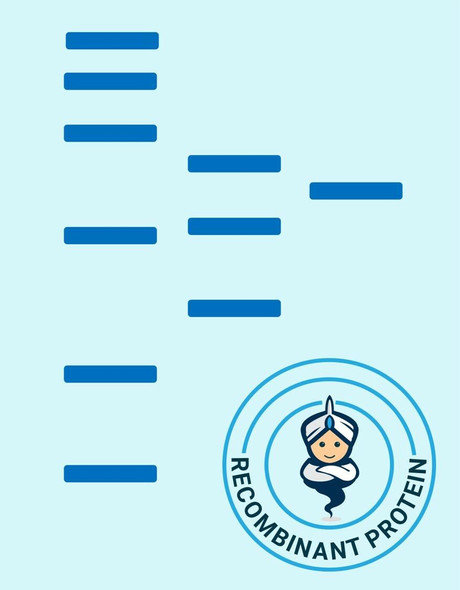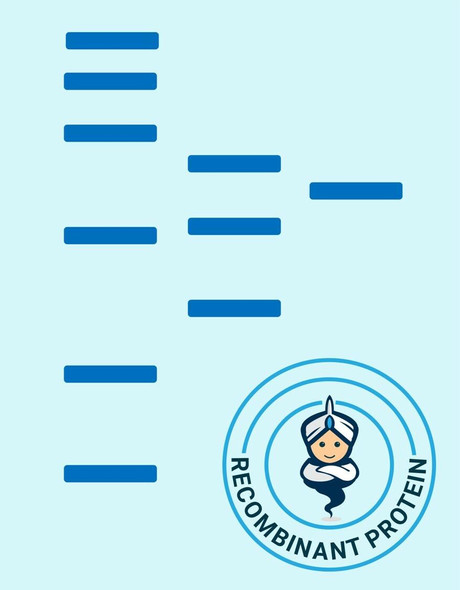Human CCL28 Recombinant Protein (RPPB1204)
- SKU:
- RPPB1204
- Product type:
- Recombinant Protein
- Size:
- 20ug
- Species:
- Human
- Target:
- CCL28
- Synonyms:
- MEC
- CCK1
- SCYA28
- MGC71902
- Source:
- Escherichia Coli
- Uniprot:
- Q9NRJ3
Description
| Product Name: | Human CCL28 Recombinant Protein |
| Product Code: | RPPB1204 |
| Size: | 20µg |
| Species: | Human |
| Target: | CCL28 |
| Synonyms: | MEC, CCK1, SCYA28, MGC71902, CCL28, C-C motif chemokine 28, Small-inducible cytokine A28, Mucosae-associated epithelial chemokine, Protein CCK1. |
| Source: | Escherichia Coli |
| Physical Appearance: | Sterile Filtered White lyophilized (freeze-dried) powder. |
| Formulation: | Lyophilized from a concentrated (1mg/ml) solution in water containing 20mM PBS and 150mM NaCl. |
| Solubility: | It is recommended to reconstitute the lyophilized CCL28 in sterile 18M?-cm H2O not less than 100µg/ml, which can then be further diluted to other aqueous solutions. |
| Stability: | Lyophilized CCL28 although stable at room temperature for 3 weeks, should be stored desiccated below -18°C. Upon reconstitution CCL28 should be stored at 4°C between 2-7 days and for future use below -18°C.For long term storage it is recommended to add a carrier protein (0.1% HSA or BSA).Please prevent freeze-thaw cycles. |
| Purity: | Greater than 97.0% as determined by:(a) Analysis by RP-HPLC.(b) Analysis by SDS-PAGE. |
| Amino Acid Sequence: | SEAILPIASS CCTEVSHHIS RRLLERVNMC RIQRADGDCD LAAVILHVKR RRICVSPHNH TVKQWMKVQA AKKNGKGNVC HRKKHHGKRN SNRAHQGKHE TYGHKTPY |
| Biological Activity: | Determined by its ability to chemoattract human lymphocytes using a concentration range of 1-10ng/ml corresponding to a Specific Activity of 100,000-1,000,000IU/mg. |
CCL28 is part of the subfamily of small cytokine CC genes. CCL28 shows chemotactic activity for resting CD4 or CD8 T cells and eosinophils. CCL28 binds to chemokine receptors CCR3 and CCR10. CCL28 is involved in the physiology of extracutaneous epithelial tissues, including diverse mucosal organs. CCL28 mediates mucosal immunity in HIV exposure and infection. CCL28 is involved in the pathogenesis of inflammatory skin diseases. Human CCL28 cDNA encodes a 127 amino acid residue precursor protein with a putative 22 amino acid residue signal peptide that is cleaved to produce the 105 amino acid residue mature protein. Human and mouse CCL28 are highly conserved, sharing 83% amino acid identity in their mature regions. CCL28 shares the most homology with CCL27/CTACK. Human and mouse CCL28 RNA expression was found to be highest in normal and pathologic colon with the protein being expressed by epithelial cells. Human CCL28 RNA was also present in normal and asthmatic lung tissues.
CCL28 Human Recombinant produced in E.Coli is a single, non-glycosylated, polypeptide chain containing 108 amino acids and having a molecular mass of 12.3 kDa. The CCL28 is purified by proprietary chromatographic techniques.
| UniProt Protein Function: | CCL28: Chemotactic activity for resting CD4, CD8 T-cells and eosinophils. Binds to CCR3 and CCR10 and induces calcium mobilization in a dose-dependent manner. Belongs to the intercrine beta (chemokine CC) family. |
| UniProt Protein Details: | Protein type:Chemokine; Secreted, signal peptide; Secreted; Motility/polarity/chemotaxis Chromosomal Location of Human Ortholog: 5p12 Cellular Component: extracellular space; extracellular region Molecular Function:chemokine activity Biological Process: elevation of cytosolic calcium ion concentration; immune response; chemotaxis; positive regulation of cell-matrix adhesion; response to nutrient |
| NCBI Summary: | This antimicrobial gene belongs to the subfamily of small cytokine CC genes. Cytokines are a family of secreted proteins involved in immunoregulatory and inflammatory processes. The CC cytokines are proteins characterized by two adjacent cysteines. The cytokine encoded by this gene displays chemotactic activity for resting CD4 or CD8 T cells and eosinophils. The product of this gene binds to chemokine receptors CCR3 and CCR10. This chemokine may play a role in the physiology of extracutaneous epithelial tissues, including diverse mucosal organs. Multiple transcript variants encoding two different isoforms have been found for this gene. [provided by RefSeq, Sep 2014] |
| UniProt Code: | Q9NRJ3 |
| NCBI GenInfo Identifier: | 12230650 |
| NCBI Gene ID: | 56477 |
| NCBI Accession: | Q9NRJ3.1 |
| UniProt Secondary Accession: | Q9NRJ3,D7RIE7, |
| UniProt Related Accession: | Q9NRJ3 |
| Molecular Weight: | 12,375 Da |
| NCBI Full Name: | C-C motif chemokine 28 |
| NCBI Synonym Full Names: | chemokine (C-C motif) ligand 28 |
| NCBI Official Symbol: | CCL28 |
| NCBI Official Synonym Symbols: | MEC; CCK1; SCYA28 |
| NCBI Protein Information: | C-C motif chemokine 28; CC chemokine CCL28; small inducible cytokine A28; small-inducible cytokine A28; mucosae-associated epithelial chemokine; chemokine (C-C motif) ligand 28 splice variant chi; small inducible cytokine subfamily A (Cys-Cys), member 28 |
| UniProt Protein Name: | C-C motif chemokine 28 |
| UniProt Synonym Protein Names: | Mucosae-associated epithelial chemokine; MEC; Protein CCK1; Small-inducible cytokine A28 |
| Protein Family: | Meckelin |
| UniProt Gene Name: | CCL28 |
| UniProt Entry Name: | CCL28_HUMAN |










